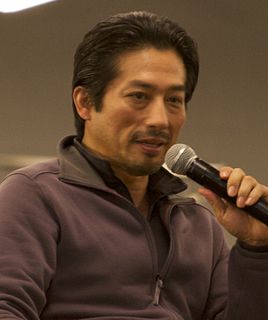A Quote by Pharrell Williams
I have an all-Japanese design team, and none of them speak English. So it's often funny and surprising how my ideas end up lost in translation.
Quote Topics
Related Quotes
One of the producers, Wonjo, was an amazing interpreter. I don't think we really knew how it was going to work at the beginning. Yet it was something that a couple of days into it seemed so seamless and it wasn't something that we noticed or thought about. A couple of times I cornered him and forced him to speak English but we didn't speak much English at all. That said, I don't think anything was ever lost in translation. It was all very easy.
The Japanese garden is a very important tool in Japanese architectural design because, not only is a garden traditionally included in any house design, the garden itself also reflects a deeper set of cultural meanings and traditions. Whereas the English garden seeks to make only an aesthetic impression, the Japanese garden is both aesthetic and reflective. The most basic element of any Japanese garden design comes from the realization that every detail has a significant value.
Some stories I write in Swedish, some in English. Short stories I've almost exclusively written in English lately, mostly because there's such a small market for them in Sweden and it doesn't really pay either. So, the translation goes both ways. What also factors in is that I have a different voice in English, which means that a straight translation wouldn't be the same as if I'd written it in English originally.
There is an old Italian proverb about the nature of translation: "Traddutore, traditore!" This means simply, "Translators-traitors!" Of course, as you can see, something is lost in the translation of this pithy expression: there is great similarity in both the spelling and the pronunciation of the original saying, but these get diluted once they are put in English dress. Even the translation of this proverb illustrates its truth!
I have a funny story to tell about English and how I came to fall in love with the language. I was desperate to fit in and spoke English all the time. Trouble was, in my household it was a no-no to speak English because somehow it is disrespectful to call parents and grandparents "you" - impersonal pronouns are offensive in Vietnamese.
I have a funny relationship to language. When I came to California when I was three I spoke Urdu fluently and I didn't speak a word of English. Within a few months I lost all my Urdu and spoke only English and then I learned Urdu all over again when I was nine. Urdu is my first language but it's not as good as my English and it's sort of become my third language. English is my best language but was the second language I learned.
Most English speakers do not have the writer's short fuse about seeing or hearing their language brutalized. This is the main reason, I suspect, that English is becoming the world's universal tongue: English-speaking natives don't care how badly others speak English as long as they speak it. French, once considered likely to become the world's lingua franca, has lost popularity because those who are born speaking it reject this liberal attitude and become depressed, insulted or insufferable when their language is ill used.
Keanu Reeves learned a lot, respecting the culture. I was surprised when I first met him. He knew a lot already and he learned a lot. And also he learned Japanese. It's incredible. On the set, switching between the Japanese and English, even for us, is very hard. It's complicated. But the first time Keanu spoke in Japanese it was a very important scene between us, and more than the dialogue's meaning, I was moved. His energy for the film, completely perfect Japanese pronunciation. It was moving, surprising, respecting.



































